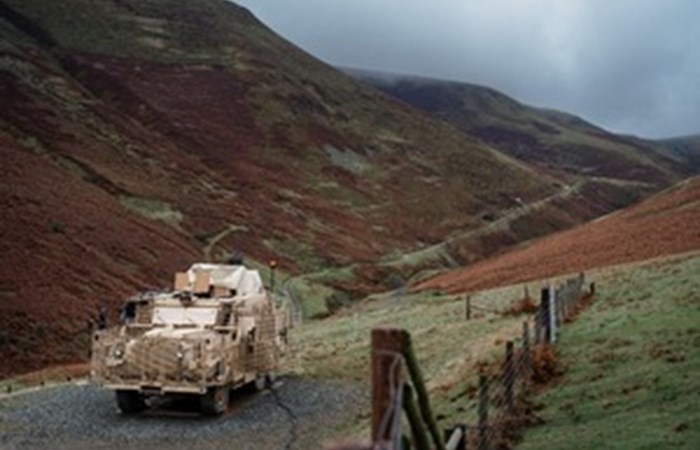Defence Science Technology Laboratory

class="gem-c-govspeak govuk-govspeak gem-c-govspeak--direction-ltr govuk-!-margin-bottom-0">
A high-energy laserweapon has been fired by the British Army from an armouredvehicle for the first time and successfully destroyed flying drones.
It works by directing an intense beam of infra-red light in the form of energy towards its target using advanced sensors and tracking systems which maintain lock-on and accuracy in real time.
Unlike conventional munitions, laser weapons are virtually limitless in terms of ammunition supply, which means they could represent a cost-effective alternative to some current in-service weapons.
The laser was integrated onto a Wolfhound a protected troop-carrying vehicle - where soldiers from 16 Royal Artillery were able to track and down hovering targets at Radnor Range in mid-Wales.
Minister for DefenceProcurement and Industry, Maria Eagle MP, said:
This ground-breaking technology demonstrates Britains commitment to staying at the forefront of military innovation.
The successful testing of this laser weapon system represents a significant step forward in ourdevelopment of possiblefuture defencecapabilities and showcases British engineering excellence.
The laser has been developed through a collaboration between the MODs Defence Equipment & Support (DE&S) and DefenceScience and Technology Laboratory (Dstl) known as Team Hersaand an industry consortium led by Raytheon UK.
This delivers on the Governments Plan for Change, by rapidly advancing technologies and building on the strong foundation of national security.
Warrant Officer Matthew Anderson, trials manager for the British Armys Mounted Close Combat Trials and Development Group, said:
Every engagement weve done has removed a drone from the sky. While weve been testing a variety of distances, speedsand altitudes, one thing has remained how quick a drone can be taken out.
Its definitely a capability that could be added to the arsenal of weapons that we use on the battlefield.
The purpose of the capability demonstrator programmeis to discover and test the potential future use of directed energy weapons by the British Army.
Having alreadybeen tested by engineers from MOD and industry, the latest experimentation by the British Army should provide knowledge, informationand experience to support future requirement decisions, ensuring the UK stays at the forefrontof this novel and disruptive technology.
Stephen Waller, Directed Energy Weapons Team Leader for DE&S, said:
This is still an emerging technology, but the world has changedand we are seeing more use of drones in the battlespace.This requires a more cost-effective solution to protect our troops.
Having the capability to track and eliminate moving drones will give UK troops a better operational advantage and these successful trials have demonstrated that we are well on our way to achieving this.
As well as Raytheon, Fraser Nash, NP Aerospace, LumOptica, Blighter Surveillance Systems and Cambridge Pixel have been involved in developing the weapon under a 16.8 million contract awarded by Team Hersa.
UK MOD will take the learnings of the project into account and assess the necessary steps to develop Laser Directed Energy Weapons for frontline use by the British Army in the future.
Matt Cork, Head of Team HersaDstl said:
The successful testing of the Laser Directed Energy Weapon demonstrator is an important step towards a future capability. This technology has the potential to offer a credible and cost-effective means to defeat a range of current and future threats, which would improve the effectiv
